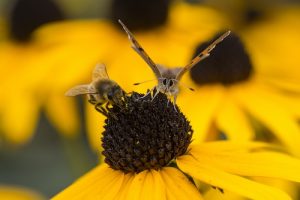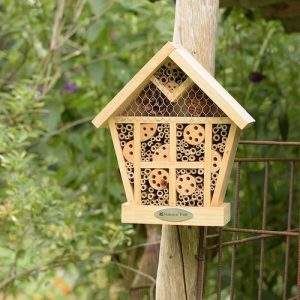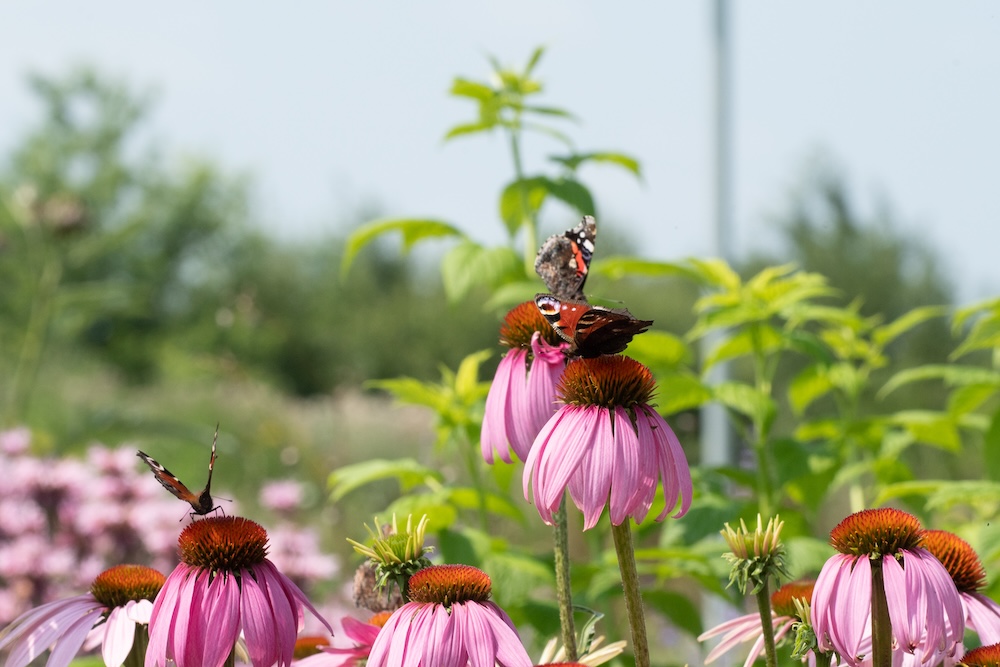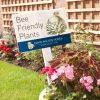Create a garden buzzing with bees, bugs and butterflies! – The latest State of Nature report revealed that shockingly, two out of three insects are in decline. A stark reminder of the challenges faced by Britain’s biodiversity, and that we must all do more to protect our precious pollinators and invertebrates.
Small steps made in the garden and to our daily lives can make a significant difference to our buzzy buddies and fluttery friends. Here, expert wildlife brand, CJ Wildlife, shares its top tips on how to help.
Wonderful wildflowers
Creating a mini meadow filled with vibrant native wildflowers will not only fill the garden with gorgeous colour, but they will also be a lifeline for visiting insects who stop by for a meal or to shelter under them. Birdsfoot trefoil, oxeye daisy, poppy and even dandelions provide our six-legged friends and beautiful butterflies with ample nectar and shelter.

Plant bee friendly blooms
To create a bee-friendly sanctuary, consider the plants you pop in the flower beds and hanging baskets. It’s best to avoid blooms with multiple flower heads as bees can struggle to get to the delicious nectar in the centre, so instead opt for single-headed flowers with flat and wide openings so bees can come and go with ease. Some fantastic options are echinacea, rudbeckia, Michaelmas daisy, and sunflowers!

Provide a safe and snug space
One major contribution to the decline of insects is a lack of suitable habitats. Thankfully, there is a solution to help the critters in your garden. Compiling log piles, leaving leaf debris and letting an area of the lawn grow wild can all support visiting bugs. If you’d prefer to keep your garden more organised, insect hotels can provide excellent shelter and a dry breeding ground for bugs, without the wild look! The National Trust Apex Insect Hotel offers multiple sections and materials for an array of insects, such as solitary bees, ladybirds and lacewings – it truly is a hotel for all kinds of creatures!
Essential water
Just like humans, insects rely on water to survive. They not only need it to keep hydrated but also to keep themselves clean and in tip top condition! If you don’t have room for a pond, why not consider creating a plant pot pond instead? It’s simple! Find a plant pot, if it has a drainage hole you’ll need to seal with pond liner, add some large stones and pebbles up to the rim, and fill with fresh water. The plant pot pond can be dug into the soil or kept upright for bugs to climb up to! For a more aesthetic look, bird baths like the Maggiore Stone-Effect Bird Bath make beautiful alternatives, just be sure to add stones and pebbles so insects can get in and out easily.

Night flyers need food too!
Moths are another vital part of a thriving environment, yet their numbers are down 33% since the late 60s. By adding night-scented blooms to the flower beds, moths can tuck into a well-earned snack ahead of their night time adventures. Choose white or dull coloured flowers to appeal best to them, with night scented phlox, moonflowers and star jasmine being excellent choices. Not only do the moths feast on the flowers, but some plants will fill your garden with a fragrant aroma in the late afternoon sun.
Being more conscious of the plants we grow in the garden and by providing space to shelter and rest, the British public can support its native insect numbers and help them thrive again.
CJ Wildlife is Europe’s leading manufacturer and distributor of garden wildlife products with over 35 years’ experience working in biodiversity. CJ Wildlife are experts in nature, on a mission to help promote biodiversity from your doorstep. They provide innovative solutions to create wildlife habitats in a range of settings, from back gardens to small urban areas. With a team of nature lovers at the heart of the business, CJ Wildlife has been a pioneer in the wild bird food world since 1987, releasing the first ‘Hi-Energy No Mess’ bird seed mix to the UK market, and a ‘Click and Go’ bird feeder designed to make cleaning and re-filling your feeder simple. They also work closely with several nature organisations across Europe and the UK to help make a real difference to wildlife, by supporting field conservation projects and creating small to large-scale wildlife habitat installations. Whilst they’ve grown into a successful international business, they remain humble to their roots and their cause – to empower and enable people to take action for wildlife.
To find out more and to browse CJ Wildlife’s products for insects, visit the website at www.birdfood.co.uk
Lilly Light


